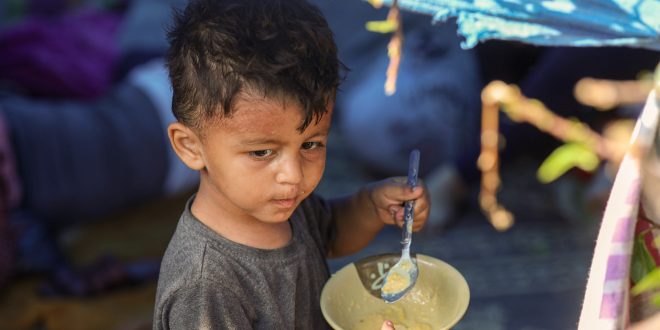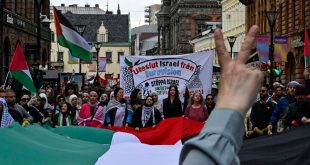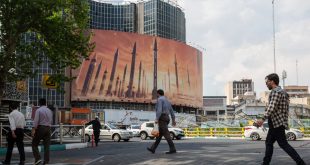Gaza City – More than 50,000 displaced Palestinians have taken refuge at the al-Shifa Hospital, squeezing in corridors, waiting rooms and outside in the courtyard.
The hospital, which is barely functioning on solar-powered generators, is in a state of collapse like the rest of the healthcare system in the Gaza Strip.
But for many families, they preferred to stay in the hospital, believing it to be a safer option than heading down south to Khan Younis. Still, the living conditions are far from ideal, due to lack of clean water and adequate shelter.
Ghaniya Haniyeh, a 41-year-old mother of five boys and three girls, sits under a makeshift tent made out of tarp and blankets.
Her family fled their home in the Sheikh Radwan neighbourhood, running away from a line of explosions in their area.
“We’re safe, but we’re suffering from the heat and the swarm of flies all around us,” Ghaniya said.
The morning begins with children or men queueing in a long line to fill up their plastic gallons jugs with salty water from a pipe. Since electricity has been cut off from the Gaza Strip, clean water is rare as the desalination plant is out of service.
Breakfast is canned fuul medames, or fava beans. Then there is another long line of people outside the toilet facilities, waiting their turn.
“We can’t shower or wash properly or change our clothes,” Ghaniya said. “We use salty water to hand wash our clothes and our dishes.”
On the ground, Ghaniya and her children sleep on two thin blankets. Other blankets act as room dividers for men and women.
“It’s difficult for the kids, and their spirits are low,” she said. “They don’t have basic hygiene and you can’t get them what they want or ask for. I hope we can return to our homes safely. We just want a normal healthy life.”
Her sister-in-law, Imm Mohammed al-Mullah, is staying in an adjacent tent with her in-laws and five children.
“The martyrs are now resting in peace, but here we are dying a slow death,” she said. “The situation is very bad. No food, no water, no electricity, no sanitation.”
There are five families gathered in their area of the courtyard. The glaring sun forces them awake at 6am and beats down on them until the late afternoon, and there is no respite from the flies.
“The salty water has made us itchy,” Imm Mohammed said. “I bathe my three-year-old son, and he goes back to playing in the sand and dirt. Now he’s got scabs all over his body. Nothing is clean. We don’t even have bedding.”
Another one of her sons has a fever, and the 34-year-old mother is sure that there will be an outbreak of smallpox.
Every day, there’s a very long line just to get water and bread,” she said. “You can’t even get a full bag of bread, only half. We’re living off of canned cheese and fava beans.”
Imm Mohammed wants to go back to her life before the war and not live “this slow death”.
But she says her home has been destroyed in an Israeli air raid, and her entire neighbourhood in Sheikh Radwan is gone.
“Just as the US, the big devil, is supporting Israel, I want to see the Arab countries fully behind us,” she said. “Where is their conscience?”
 Top Naija News: Nigerian News, Breaking News Nigeria and World News Top Naija News is a daily news publication in Nigeria, delivering the latest breaking news in Nigeria and around the world.
Top Naija News: Nigerian News, Breaking News Nigeria and World News Top Naija News is a daily news publication in Nigeria, delivering the latest breaking news in Nigeria and around the world.




